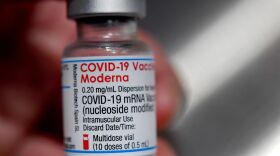The Johnson & Johnson coronavirus vaccine has been linked to an extremely rare neurological disorder, according to the Centers for Disease Control and Prevention. Of the more than 12 million vaccine doses administered in the U.S., there have been around 100 reports of people developing Guillain-Barré syndrome.
In light of the newly documented risk, the Food and Drug Administration has updated the label of the vaccine to include a new warning: "Guillain-Barré Syndrome Reports of adverse events following use of the Janssen COVID-19 Vaccine under emergency use authorization suggest an increased risk of Guillain-Barré syndrome during the 42 days following vaccination."
Guillain-Barré can cause numbness in the extremities and lead to full-body paralysis in the most severe cases, but most people recover. Of the 100 or so cases reported in relation to the Johnson & Johnson vaccine, most were men age 50 and older who developed the syndrome around two weeks after getting vaccinated, according to the CDC.
The organization's Advisory Committee on Immunization Practices is set to meet and discuss the matter at a later date.
In a statement, Johnson & Johnson reiterated that the chances of those who get the vaccine developing Guillain-Barré is "very low."
"The safety and well-being of the people who use our products is our number one priority," that statement said.
Copyright 2021 NPR. To see more, visit https://www.npr.org. 9(MDA3MzEzNjc2MDEzMDI2Mzc4OTc4NTFmNg001))







